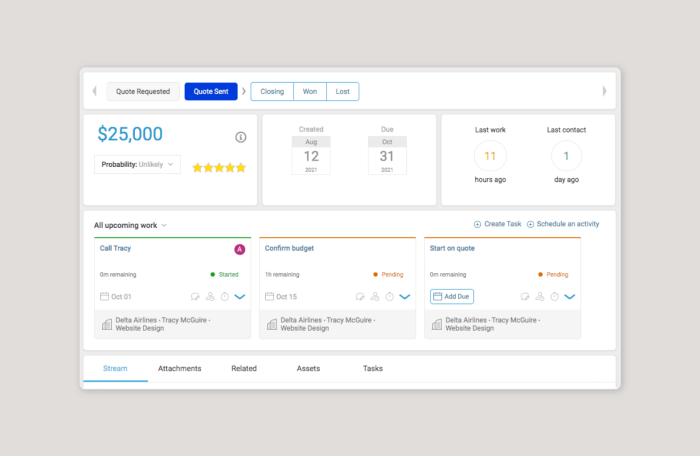Crm software for accountants – In today’s competitive landscape, accounting firms need more than just accurate bookkeeping. Client relationship management (CRM) software is becoming increasingly vital for attracting new clients, retaining existing ones, and ultimately, boosting profitability. This comprehensive guide explores the benefits of CRM for accountants, Artikels key features to look for, and helps you choose the right software for your practice’s specific needs.
We’ll delve into various aspects, including integration with accounting software, automation capabilities, and the overall impact on firm efficiency and client satisfaction.

Source: flowlu.com
Why Accountants Need CRM Software
Accounting firms, traditionally viewed as number-crunchers, are evolving into trusted business advisors. This shift necessitates a more proactive approach to client engagement. CRM software facilitates this evolution by providing a centralized hub for all client-related information. This includes contact details, communication history, financial data, project timelines, and more. This centralized approach offers several key benefits:
Improved Client Relationship Management
- Enhanced Communication: Track interactions, automate follow-ups, and ensure timely responses to client inquiries, fostering stronger relationships.
- Personalized Service: Access comprehensive client profiles to tailor services and communication, demonstrating a deeper understanding of their individual needs.
- Increased Client Retention: Proactive engagement and personalized service contribute to higher client satisfaction and reduced churn.
Streamlined Workflow and Increased Efficiency
- Automation of Tasks: Automate repetitive tasks like email marketing, appointment scheduling, and invoice generation, freeing up time for higher-value activities.
- Centralized Data: Eliminate the need to search across multiple platforms for client information, saving valuable time and reducing errors.
- Improved Collaboration: Facilitate seamless collaboration among team members by providing a shared platform for accessing and updating client information.
Business Growth and Enhanced Profitability
- Lead Generation and Management: Track leads, nurture prospects, and convert them into paying clients more efficiently.
- Targeted Marketing Campaigns: Segment clients based on demographics, services used, and other criteria to create highly effective marketing campaigns.
- Improved Sales Performance: Track sales pipelines, identify opportunities for upselling and cross-selling, and boost overall revenue.
Key Features of CRM Software for Accountants
Choosing the right CRM involves identifying the features most relevant to your firm’s needs. Consider these essential functionalities:
Contact Management
A robust contact management system is fundamental. Look for features like:
- Centralized Database: Store all client contact information in one place.
- Customizable Fields: Add fields relevant to your specific business needs (e.g., tax deadlines, industry, preferred communication method).
- Contact Segmentation: Group clients based on various criteria for targeted marketing and communication.
Communication Tools
Effective communication is crucial. Consider features like:
- Email Integration: Send and track emails directly within the CRM.
- Calendar and Scheduling: Schedule appointments and track client meetings efficiently.
- Document Management: Store and share client documents securely.
Reporting and Analytics, Crm software for accountants
Data-driven insights are essential for making informed decisions. Look for:
- Customizable Reports: Generate reports on key metrics like client acquisition cost, revenue per client, and customer lifetime value.
- Real-time Dashboards: Monitor key performance indicators (KPIs) at a glance.
- Data Export Capabilities: Export data to other applications for further analysis.
Integration with Accounting Software
Seamless integration with your existing accounting software is vital for maximizing efficiency. Ensure the CRM you choose integrates with platforms like:
- Xero
- QuickBooks
- Sage
Automation Capabilities
Automation can significantly reduce manual work. Look for features like:
- Workflow Automation: Automate repetitive tasks like email sequences and follow-ups.
- Task Management: Assign and track tasks within the CRM.
- Appointment Reminders: Send automatic reminders to clients about upcoming appointments.
Choosing the Right CRM for Your Accounting Firm
The best CRM for your firm depends on several factors, including your budget, firm size, and specific needs. Consider these factors:
- Scalability: Choose a CRM that can grow with your firm.
- Ease of Use: Select a user-friendly system that your team can easily adopt.
- Customer Support: Ensure the vendor offers reliable customer support.
- Pricing: Compare pricing models and choose a plan that fits your budget.
Frequently Asked Questions (FAQs)
- Q: What is the cost of CRM software for accountants? A: The cost varies greatly depending on the features, vendor, and the number of users. Expect to pay anywhere from a few dollars per month to hundreds of dollars per month.
- Q: How long does it take to implement CRM software? A: Implementation time depends on the complexity of the system and your firm’s size. It can range from a few days to several weeks.
- Q: Does CRM software integrate with my existing accounting software? A: Many CRM solutions offer integrations with popular accounting software packages like Xero, QuickBooks, and Sage. Check the vendor’s website for compatibility information.
- Q: What are the key benefits of using CRM software for my accounting practice? A: Key benefits include improved client relationships, streamlined workflows, increased efficiency, enhanced lead generation, and ultimately, improved profitability.
- Q: Can CRM software help with client retention? A: Absolutely! By enabling personalized communication and proactive engagement, CRM software significantly improves client satisfaction and reduces churn.
Resources
- HubSpot CRM
- Salesforce for Accounting
- Zoho CRM
- (Add more relevant links to other CRM software providers)
Conclusion
Investing in CRM software is a strategic move for accounting firms seeking to enhance client relationships, streamline operations, and drive growth. By carefully considering your firm’s needs and selecting the right solution, you can unlock significant improvements in efficiency, profitability, and client satisfaction. Don’t hesitate to explore the options available and choose the CRM that best fits your unique requirements.
Call to Action: Crm Software For Accountants
Ready to transform your accounting practice? Contact us today for a free consultation and let us help you find the perfect CRM solution to meet your specific needs. Click here to schedule a demo!

Source: cloudfront.net
Query Resolution
What are the key features to look for in accounting CRM software?
Essential features include client relationship management, contact management, task automation, reporting and analytics, and seamless integration with accounting software.
How much does CRM software for accountants typically cost?
Pricing varies greatly depending on the features, vendor, and number of users. Expect options ranging from affordable monthly subscriptions to more substantial enterprise solutions.
What is the typical implementation timeline for CRM software?
Implementation timelines depend on the complexity of the system and the firm’s size. Expect a period of several weeks to several months for full integration and training.
Can CRM software integrate with my existing accounting software?
Many CRM systems offer integrations with popular accounting software packages. It’s crucial to verify compatibility before selecting a system.
